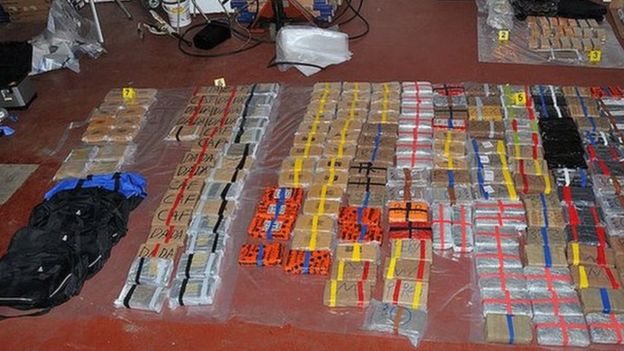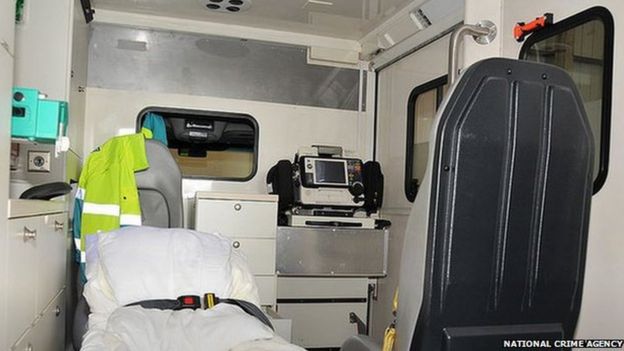
A Dutch man has been found guilty over an operation to use a fleet of fake ambulances to smuggle drugs with a street value of £1.6bn into the UK.
Father-of-four Leonardus Bijlsma, 55, was described as the “right-hand man” in the operation involving specially adapted vehicles and using ports from Essex to East Yorkshire.
He will be sentenced at a later date.
Co-defendant Dennis Vogelaar, 28, was found not guilty by a jury at Birmingham Crown Court.
Olof Schoon, 38, and 51-year-old Richard Engelsbel, had already pleaded guilty at an earlier hearing.
 Image copyrightNational Crime Agency
Image copyrightNational Crime Agency‘Audacious’ operation
Schoon was described as “the central player” in the operation, which saw a fleet of fully taxed and insured ambulances created in the Netherlands under the pretence of transporting patients to the UK.
Fake invoices and paperwork for false patient transfers to The Royal London Hospital were produced by Schoon’s company, despite the hospital having no records of any trips, with false addresses and phone numbers for patients also made.
The scheme ran from April last year until all four men were arrested after a raid by officers from the National Crime Agency in Smethwick in June.
At the time of the arrests, Schoon was believed to have made 39 separate journeys.
In court: BBC News reporter Phil Mackie
We have called them ‘fake’ ambulances because they weren’t used for their intended purpose, but they were the real thing. The drugs smugglers were making so much money they were able to buy a small fleet of vehicles and have them all painted in their “company” livery to make them look like genuine medical transport vehicles.
The conspirators – all Dutch nationals – pretended to run a business repatriating sick British patients for insurance companies. They created fake invoices and receipts and they even hired people to pretend to be patients. It is possible the same vehicles were used to transport narcotics along different routes in Europe.
This was a sophisticated and well funded operation that successfully imported a huge quantity of class A drugs before it was discovered.
Following the arrests, officers uncovered four more ambulances in a raid on two premises in the Netherlands, with analysis finding 45 trips to locations in Essex, London, Manchester, Merseyside, the Midlands and West Yorkshire.
In total an estimated £420m of high-purity drugs with a street value of £1.6bn are believed to have been smuggled into the UK.
Prosecutor Robert Davies said the smugglers acted “arrogantly” in carrying out their deals.
“This was a top-level, audacious, and – up to the point of interception and the arrests – successful and lucrative criminal conspiracy,” he said.
 Image copyrightNational Crime agency
Image copyrightNational Crime agencyThe court heard Bijlsma was the “right-hand man” in the operation to bring large quantities of drugs into the UK.
When officers examined the ambulance, they found concealed compartments behind metal rivet panels containing colour-coded parcels.
Inside was 193kg of cocaine worth £30m, 74kg of heroin worth £8m in individual deals, and ecstasy tablets and crystal worth £60,000.
Bijlsma had said he was paid 250 euros (£176) per journey by Schoon to be his “co-driver” and handyman on 16 trips across the Channel.
When his DNA was found on a rivet gun and gloves in one of the hidden compartments, he claimed it was because he had used them, adding he was too “dirty” to go into the “sterilised” part of the ambulance reserved for patients.
[“source-bbc”]